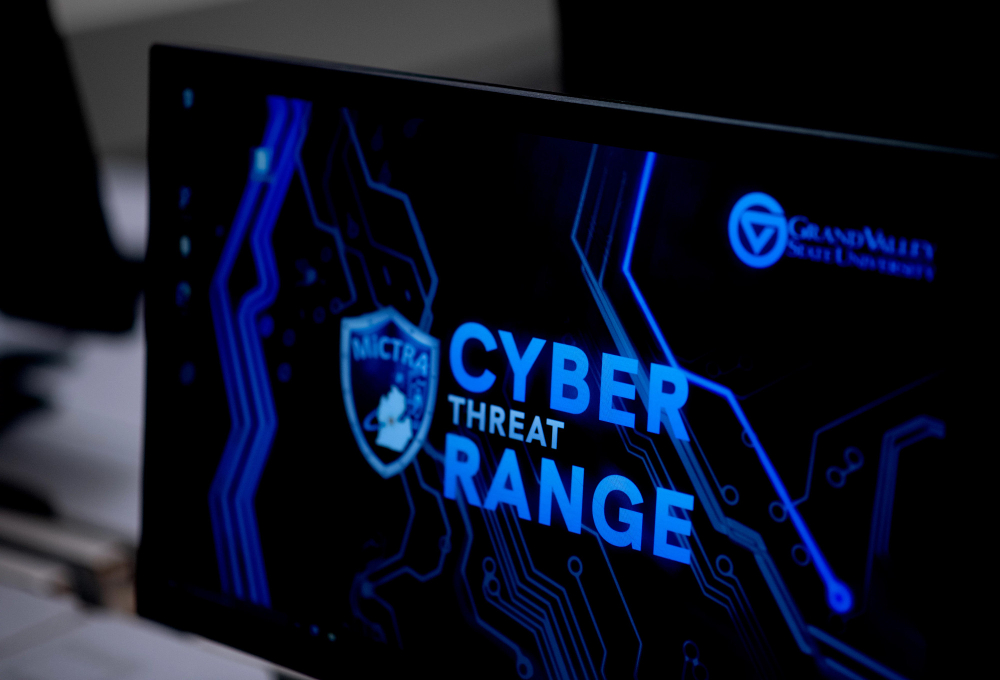Cybersecurity
Master of Science (M.S.)
Graduate Major
Grand Rapids • Face to face • Hybrid • Online • 33-34 Credits

Graduate Major
Grand Rapids • Face to face • Hybrid • Online • 33-34 Credits
Cybersecurity is the practice of protecting systems, networks, and data from digital attacks, unauthorized access, and damage.
Grand Valley's Master of Science (M.S.) in Cybersecurity is designed for computing professionals seeking to advance their knowledge and career opportunities in the field. The program builds skills to recognize, prepare for, defend against, and investigate current and future threats. Covering vast cybersecurity theories, students are prepared to address diverse issues across an organization. Theoretical concepts are integrated with hands-on applications throughout the curriculum.
Students can expect a broad, comprehensive curriculum. Coursework includes cryptography, where students learn to secure information through encryption techniques, and data analysis, which focuses on interpreting and protecting data. Network security is another key area, teaching students how to safeguard networks from threats. Security policy and threat modeling are also covered, providing insights into creating effective security strategies and identifying potential risks. Additionally, students delve into cyber-forensics to investigate digital crimes, explore legal and ethical issues surrounding cybersecurity, and learn about secure software development and systems security to protect and maintain secure computing environments. All students complete a capstone experience, choosing either a thesis or an applied project.
Grand Valley's cybersecurity program offers a robust theoretical foundation and practical experience, providing excellent preparation for the job market and valuable industry exposure. The program focuses on the underlying principles of cybersecurity, equipping students to tackle both current and future challenges. Designed for working professionals, it offers flexible class schedules in the evenings or online. All graduate faculty members are experts with doctorate degrees, and students have opportunities to collaborate on ongoing research projects.
Samah Mansour, Ph.D.
(616) 331-3051
Application Deadline
Applications are accepted on a rolling basis. Deadlines for international students are May 1 for fall and October 15 for winter; domestic student deadlines are July 1 for fall and December 1 for winter. The $30 nonrefundable application fee is waived if the applicant has previously applied to GVSU.
Plan, initiate, and manage information technology (IT) projects. Lead and guide the work of technical staff. Serve as liaison between business and technical aspects of projects. Plan project stages and assess business implications for each stage. Monitor progress to assure deadlines, standards, and cost targets are met.
Top skills| Annual Earnings | Percentile |
|---|---|
| $ 48,134.55 | 10% |
| $ 70,095.77 | 25% |
| $ 98,869.74 | 50% |
| $129,225.34 | 75% |
| $155,051.36 | 90% |
Conduct security assessments for organizations, and design security systems and processes. May specialize in areas such as physical security or the safety of employees and facilities.
Top skills| Annual Earnings | Percentile |
|---|---|
| $ 44,543.98 | 10% |
| $ 58,668.22 | 25% |
| $ 76,778.08 | 50% |
| $ 97,601.23 | 75% |
| $131,092.64 | 90% |
Design and implement computer and information networks, such as local area networks (LAN), wide area networks (WAN), intranets, extranets, and other data communications networks. Perform network modeling, analysis, and planning, including analysis of capacity needs for network infrastructures. May also design network and computer security measures. May research and recommend network and data communications hardware and software.
Top skills| Annual Earnings | Percentile |
|---|---|
| $ 64,139.82 | 10% |
| $ 88,714.60 | 25% |
| $116,685.05 | 50% |
| $143,924.89 | 75% |
| $166,646.18 | 90% |
Develop and oversee the implementation of information security procedures and policies. Build, maintain and upgrade security technology, such as firewalls, for the safe use of computer networks and the transmission and retrieval of information. Design and implement appropriate security controls to identify vulnerabilities and protect digital files and electronic infrastructures. Monitor and respond to computer security breaches, viruses, and intrusions, and perform forensic investigation. May oversee the assessment of information security systems.
Top skills| Annual Earnings | Percentile |
|---|---|
| $ 48,134.55 | 10% |
| $ 70,095.77 | 25% |
| $ 98,869.74 | 50% |
| $129,225.34 | 75% |
| $155,051.36 | 90% |
Plan, implement, upgrade, or monitor security measures for the protection of computer networks and information. Assess system vulnerabilities for security risks and propose and implement risk mitigation strategies. May ensure appropriate security controls are in place that will safeguard digital files and vital electronic infrastructure. May respond to computer security breaches and viruses.
Top skills| Annual Earnings | Percentile |
|---|---|
| $ 61,017.65 | 10% |
| $ 79,588.64 | 25% |
| $104,134.29 | 50% |
| $129,116.35 | 75% |
| $164,460.11 | 90% |
Watch Program Director Samah Mansour, Ph.D. give a program overview of the M.S. in Cybersecurity.
If you are a future undergraduate student who is already interested in graduate studies, our combined degree program will save you time and money. The College of Computing offers a variety of combined degree programs that result in both a bachelor's degree and an M.S. in Cybersecurity. They include:
A digital badge, or badge, is a record of achievement that recognizes a student's completion of a coherent and meaningful academic experience. The College of Computing offers a variety of graduate badges to help you advance your career.